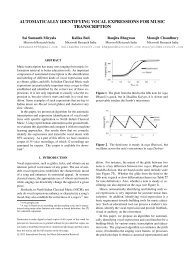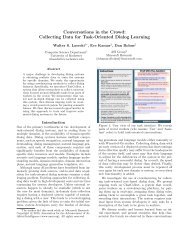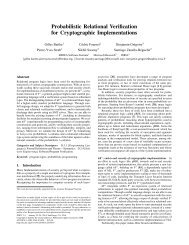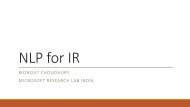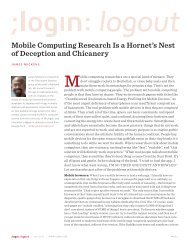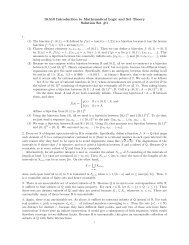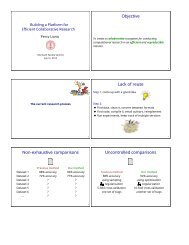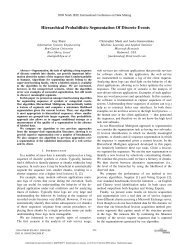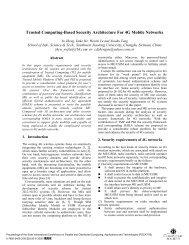Wearing the hair shirt Wearing the hair shirt - Microsoft Research
Wearing the hair shirt Wearing the hair shirt - Microsoft Research
Wearing the hair shirt Wearing the hair shirt - Microsoft Research
Create successful ePaper yourself
Turn your PDF publications into a flip-book with our unique Google optimized e-Paper software.
<strong>Wearing</strong> <strong>the</strong> <strong>hair</strong> <strong>shirt</strong><br />
A retrospective on Haskell<br />
Simon Peyton Jones<br />
<strong>Microsoft</strong> <strong>Research</strong>, Cambridge
Haskell is 15 years old<br />
(born FPCA 87)
Haskell is 15 years old<br />
(born FPCA’87)<br />
Simon is 45 years old<br />
(born 18 Jan: POPL’58)
The primoridal soup<br />
FPCA, Sept 1987: initial meeting. A dozen lazy<br />
functional programmers, wanting to agree on a<br />
common language.<br />
Suitable for teaching, research, and application<br />
Formally-described syntax and semantics<br />
Freely available<br />
Embody <strong>the</strong> apparent consensus of ideas<br />
Reduce unnecessary diversity<br />
Led to...a succession of face-to-face meetings<br />
April 1990: Haskell 1.0 report released<br />
(editors: Hudak, Wadler)
Timeline<br />
Sept 87: kick off<br />
Apr 90: Haskell 1.0<br />
Aug 91: Haskell 1.1 (153pp)<br />
May 92: Haskell 1.2 (SIGPLAN Notices) (164pp)<br />
May 96: Haskell 1.3. Monadic I/O,<br />
separate library report<br />
Apr 97: Haskell 1.4 (213pp)<br />
Feb 99: Haskell 98 (240pp)<br />
The Book!<br />
Dec 02: Haskell 98 revised (260pp)
Haskell 98<br />
Haskell<br />
development<br />
Haskell 98<br />
•Stable<br />
•Documented<br />
•Consistent across<br />
implementations<br />
•Useful for teaching,<br />
books<br />
Haskell + extensions<br />
•Dynamic, exciting<br />
•Unstable,<br />
undocumented,<br />
implementations vary...
Reflections on <strong>the</strong> process<br />
<br />
<br />
<br />
The idea of having a fixed standard<br />
(Haskell 98) in parallel with an evolving<br />
language, has worked really well<br />
Formal semantics only for fragments<br />
(but see [Faxen2002])<br />
A smallish, ra<strong>the</strong>r pointy-headed userbase<br />
makes Haskell nimble. Haskell has<br />
evolved rapidly and continues to do so.<br />
Motto: avoid success at all costs
The price of usefulness<br />
Libraries increasingly important:<br />
– 1996: Separate libraries Report<br />
– 2001: Hierarchical library naming structure,<br />
increasingly populated<br />
Foreign-function interface increasingly<br />
important<br />
– 1993 onwards: a variety of experiments<br />
– 2001: successful effort to standardise a FFI<br />
across implementations<br />
Any language large enough to be useful is<br />
dauntingly complex
Reflections on process<br />
Self-appointed committee initially,<br />
but increasingly open process: <strong>the</strong>re<br />
is now no Haskell committee<br />
Language development by user<br />
suggestion + implementers<br />
Gives too much power to<br />
implementers?
Good ideas from o<strong>the</strong>r languages<br />
List comprehensions<br />
[(x,y) | x
Syntactic redundancy<br />
Seductive idea: provide just one way<br />
of doing any particular thing<br />
Haskell’s choice: provide multiple<br />
ways, and let <strong>the</strong> programmer decide<br />
Main example: “declaration style” vs<br />
“expression style”
“Declaration style”<br />
Define a function as a series of<br />
independent equations<br />
map f [] = []<br />
map f (x:xs) = f x : map f xs<br />
sign x | x>0 = 1<br />
| x==0 = 0<br />
| x
“Expression style”<br />
Define a function as an expression<br />
map = \f xs -> case xs of<br />
[] -> []<br />
(x:xs) -> map f xs<br />
sign = \x -> if x>0 <strong>the</strong>n 1<br />
else if x==0 <strong>the</strong>n 0<br />
else -1
Fat vs thin<br />
Expression style<br />
•Let<br />
•Lambda<br />
•Case<br />
•If<br />
Declaration style<br />
•Where<br />
•Function arguments on lhs<br />
•Pattern-matching<br />
•Guards<br />
SLPJ’s conclusion<br />
syntactic redundancy is a big win<br />
Tony Hoare’s comment “I fear that Haskell is doomed to succeed”
Example (ICFP02 prog comp)<br />
Pattern<br />
match<br />
Pattern<br />
guard<br />
Guard<br />
Conditional<br />
Where<br />
clause<br />
sp_help item@(Item cur_loc cur_link _) wq vis<br />
| cur_length > limit -- Beyond limit<br />
= sp wq vis<br />
| Just vis_link = linkLength vis_link <strong>the</strong>n<br />
-- Current link is no better<br />
sp wq vis<br />
else<br />
-- Current link is better<br />
emit vis item ++ sp wq vis'<br />
| o<strong>the</strong>rwise -- Not visited yet<br />
= emit vis item ++ sp wq' vis'<br />
where<br />
vis’ = ...<br />
wq = ...
So much for syntax...<br />
What is important or<br />
interesting about<br />
Haskell?
What really matters?
Laziness<br />
John Hughes’s famous paper “Why<br />
functional programming matters”<br />
– Modular programming needs powerful<br />
glue<br />
– Lazy evaluation enables new forms of<br />
modularity; in particular, separating<br />
generation from selection.<br />
– Non-strict semantics means that<br />
unrestricted beta substitution is OK.
But...<br />
Laziness makes it much, much harder to<br />
reason about performance, especially<br />
space. Tricky uses of seq for effect<br />
seq :: a -> b -> b<br />
Laziness has a real implementation cost<br />
Laziness can be added to a strict language<br />
(although not as easily as you might think)<br />
And it’s not so bad only having βV instead<br />
of β<br />
So why wear <strong>the</strong> <strong>hair</strong> <strong>shirt</strong> of laziness?
Laziness<br />
Laziness is jolly convenient<br />
Used in<br />
two cases<br />
Used in<br />
one case<br />
sp_help item@(Item cur_loc cur_link _) wq vis<br />
| cur_length > limit -- Beyond limit<br />
= sp wq vis<br />
| Just vis_link = linkLength vis_link <strong>the</strong>n<br />
sp wq vis<br />
else<br />
emit vis item ++ sp wq vis'<br />
| o<strong>the</strong>rwise<br />
= emit vis item ++ sp wq' vis'<br />
where<br />
vis’ = ...<br />
wq’ = ...
Combinator libraries<br />
Recursive values are jolly useful<br />
type Parser a = String -> (a, String)<br />
exp :: Parser Expr<br />
exp = lit “let” decls lit “in” exp<br />
||| exp aexp<br />
||| ...etc...<br />
This is illegal in ML, because of <strong>the</strong> value restriction<br />
Can only be made legal by eta expansion.<br />
But that breaks <strong>the</strong> Parser abstraction,<br />
and is extremely gruesome:<br />
exp x = (lit “let” decls lit “in” exp<br />
||| exp aexp<br />
||| ...etc...) x
Laziness keeps you honest<br />
Every call-by-value language has given into<br />
<strong>the</strong> siren call of side effects<br />
But in Haskell<br />
(print “yes”) + (print “no”)<br />
just does not make sense. Even worse is<br />
[print “yes”, print “no”]<br />
So effects (I/O, references, exceptions)<br />
are just not an option.<br />
Result: prolonged embarrassment.<br />
Stream-based I/O, continuation I/O...<br />
but NO DEALS WIH THE DEVIL
Monadic I/O<br />
A value of type (IO t) is an “action”<br />
that, when performed, may do<br />
some input/output before<br />
delivering a result of type t.<br />
eg.<br />
getChar :: IO Char<br />
putChar :: Char -> IO ()
Performing I/O<br />
main :: IO a<br />
A program is a single I/O action<br />
Running <strong>the</strong> program performs <strong>the</strong> action<br />
Can’t do I/O from pure code.<br />
Result: clean separation of pure code from<br />
imperative code
Connecting I/O operations<br />
(>>=) :: IO a -> (a -> IO b) -> IO b<br />
return :: a -> IO a<br />
eg.<br />
getChar >>= (\a -><br />
getChar >>= (\b -><br />
putChar b >>= (\() -><br />
return (a,b))))
The do-notation<br />
getChar >>= \a -><br />
getChar >>= \b -><br />
putchar b >>= \()-><br />
return (a,b)<br />
==<br />
do {<br />
a =), return<br />
Deliberately imperative “look and feel”
Control structures<br />
Values of type (IO t) are first class<br />
So we can define our own “control structures”<br />
forever :: IO () -> IO ()<br />
forever a = do { a; forever a }<br />
repeatN :: Int -> IO () -> IO ()<br />
repeatN 0 a = return ()<br />
repeatN n a = do { a; repeatN (n-1) a }<br />
e.g. repeatN 10 (putChar ‘x’)
Monads generally<br />
A monad consists of:<br />
A type constructor M<br />
bind :: M a -> (a -> M b) -> M b<br />
unit :: a -> M a<br />
PLUS some per-monad operations (e.g.<br />
getChar :: IO Char)<br />
There are lots of useful<br />
monads, not only I/O
Monads<br />
<br />
<br />
<br />
Exceptions<br />
type Exn a = Ei<strong>the</strong>r String a<br />
fail :: String -> Exn a<br />
Unique supply<br />
type Uniq a = Int -> (a, Int)<br />
new :: Uniq Int<br />
Parsers<br />
type Parser a = String -> [(a,String)]<br />
alt :: Parser a -> Parser a -> Parser a<br />
Monad combinators (e.g. sequence, fold,<br />
etc), and do-notation, work over all monads
Example: a type checker<br />
tcExpr :: Expr -> Tc Type<br />
tcExpr (App fun arg)<br />
= do { fun_ty
The IO monad<br />
<br />
<br />
The IO monad allows controlled introduction of<br />
o<strong>the</strong>r effect-ful language features (not just I/O)<br />
State<br />
newRef :: IO (IORef a)<br />
read :: IORef s a -> IO a<br />
write :: IORef s a -> a -> IO ()<br />
Concurrency<br />
fork :: IO a -> IO ThreadId<br />
newMVar :: IO (MVar a)<br />
takeMVar :: MVar a -> IO a<br />
putMVar :: MVar a -> a -> IO ()
What have we achieved?<br />
<br />
The ability to mix imperative and purelyfunctional<br />
programming<br />
Imperative “skin”<br />
Purely-functional<br />
core
What have we achieved?<br />
<br />
<br />
...without ruining ei<strong>the</strong>r<br />
All laws of pure functional programming<br />
remain unconditionally true, even of actions<br />
e.g. let x=e in ...x....x...<br />
=<br />
....e....e.....
What we have not achieved<br />
<br />
Imperative programming is no easier than it<br />
always was<br />
e.g. do { ...; x
Open challenge 1<br />
Open problem: <strong>the</strong> IO monad has become Haskell’s sinbin.<br />
(Whenever we don’t understand something, we<br />
toss it in <strong>the</strong> IO monad.)<br />
Festering sore:<br />
unsafePerformIO :: IO a -> a<br />
Dangerous, indeed type-unsafe, but occasionally<br />
indispensable.<br />
Wanted: finer-grain effect partitioning<br />
e.g.<br />
IO {read x, write y} Int
Open challenge 2<br />
Which would you prefer?<br />
do { a
Monad summary<br />
Monads are a beautiful example of a<br />
<strong>the</strong>ory-into-practice (more <strong>the</strong> thought<br />
pattern than actual <strong>the</strong>orems)<br />
Hidden effects are like hire-purchase: pay<br />
nothing now, but it catches up with you in<br />
<strong>the</strong> end<br />
Enforced purity is like paying up front:<br />
painful on Day 1, but usually worth it<br />
But we made one big mistake...
Our biggest mistake<br />
Using <strong>the</strong> scary term<br />
“monad”<br />
ra<strong>the</strong>r than<br />
“warm fuzzy thing”
What really matters?<br />
Laziness<br />
Purity and monads<br />
Type classes<br />
Sexy types
SLPJ conclusions<br />
Purity is more important than, and quite<br />
independent of, laziness<br />
The next ML will be pure, with effects<br />
only via monads<br />
Still unclear exactly how to add laziness to<br />
a strict language. For example, do we want<br />
a type distinction between (say) a lazy Int<br />
and a strict Int?
Type classes<br />
class Eq a where<br />
(==) :: a -> a -> Bool<br />
instance Eq Int where<br />
i1 == i2 = eqInt i1 i2<br />
Initially, just a neat<br />
way to get systematic<br />
overloading of (==),<br />
read, show.<br />
instance (Eq a) => Eq [a] where<br />
[] == [] = True<br />
(x:xs) == (y:ys) = (x == y) && (xs == ys)<br />
member :: Eq a => a -> [a] -> Bool<br />
member x []<br />
= False<br />
member x (y:ys) | x==y = True<br />
| o<strong>the</strong>rwise = member x ys
Implementing type classes<br />
data Eq a = MkEq (a->a->Bool)<br />
eq (MkEq e) = e<br />
dEqInt :: Eq Int<br />
dEqInt = MkEq eqInt<br />
Instance<br />
declarations create<br />
dictionaries<br />
Class witnessed<br />
by a “dictionary”<br />
of methods<br />
dEqList :: Eq a -> Eq [a]<br />
dEqList (MkEq e) = MkEq el<br />
where el [] [] = True<br />
el (x:xs) (y:ys) = x `e` y && xs `el` ys<br />
Overloaded<br />
functions<br />
take extra<br />
dictionary<br />
parameter(s)<br />
member :: Eq a -> a -> [a] -> Bool<br />
member d x []<br />
= False<br />
member d x (y:ys) | eq d x y = True<br />
| o<strong>the</strong>rwise = member deq x ys
Type classes over time<br />
Type classes are <strong>the</strong> most unusual<br />
feature of Haskell’s type system<br />
Wild enthusiasm<br />
Hey, what’s<br />
<strong>the</strong> big<br />
deal?<br />
Incomprehension<br />
Despair<br />
Hack,<br />
hack,<br />
hack<br />
1987 1989 1993 1997<br />
Implementation begins
Type classes are useful<br />
Type classes have proved extraordinarily<br />
convenient in practice<br />
Equality, ordering, serialisation, numerical<br />
operations, and not just <strong>the</strong> built-in ones<br />
(e.g. pretty-printing, time-varying values)<br />
Monadic operations<br />
class Monad m where<br />
return :: a -> m a<br />
(>>=) :: m a -> (a -> m b) -> m b<br />
fail :: String -> m a<br />
Note <strong>the</strong> higher-kinded type variable, m
Quickcheck<br />
propRev :: [Int] -> Bool<br />
propRev xs = reverse (reverse xs) == xs<br />
propRevApp :: [Int] -> [Int] -> Bool<br />
propRevApp xs ys = reverse (xs++ys) ==<br />
reverse ys ++ reverse xs<br />
ghci> quickCheck propRev<br />
OK: passed 100 tests<br />
ghci> quickCheck propRevApp<br />
OK: passed 100 tests<br />
Quickcheck (which is just a Haskell 98 library)<br />
Works out how many arguments<br />
Generates suitable test data<br />
Runs tests
Quickcheck<br />
quickCheck :: Test a => a -> IO ()<br />
class Test a where<br />
prop :: a -> Rand -> Bool<br />
class Arby a where<br />
arby :: Rand -> a<br />
instance (Arby a, Test b) => Test (a->b) where<br />
prop f r = prop (f (arby r1)) r2<br />
where (r1,r2) = split r<br />
instance Test Bool where<br />
prop b r = b
Extensiblity<br />
Like OOP, one can add new data<br />
types “later”. E.g. QuickCheck works<br />
for your new data types (provided<br />
you make <strong>the</strong>m instances of Arby)<br />
...but also not like OOP
Type-based dispatch<br />
class Num a where<br />
(+) :: a -> a -> a<br />
negate :: a -> a<br />
fromInteger :: Integer -> a<br />
...<br />
A bit like OOP, except that method suite<br />
passed separately?<br />
double :: Num a => a -> a<br />
double x = x+x<br />
No: type classes implement type-based<br />
dispatch, not value-based dispatch
Type-based dispatch<br />
class Num a where<br />
(+) :: a -> a -> a<br />
negate :: a -> a<br />
fromInteger :: Integer -> a<br />
...<br />
double :: Num a => a -> a<br />
double x = 2*x<br />
means<br />
double :: Num a -> a -> a<br />
double d x = mul d (fromInteger d 2) x<br />
The overloaded value is returned by<br />
fromInteger, not passed to it. It is <strong>the</strong><br />
dictionary (and type) that are passed as<br />
argument to fromInteger
Type-based dispatch<br />
So <strong>the</strong> links to intensional polymorphism<br />
are much closer than <strong>the</strong> links to OOP.<br />
The dictionary is like a proxy for <strong>the</strong><br />
(interesting aspects of) <strong>the</strong> type argument<br />
of a polymorphic function.<br />
f :: forall a. a -> Int<br />
f t (x::t) = ...typecase t...<br />
f :: forall a. C a => a -> Int<br />
f x = ...(call method of C)...<br />
Intensional<br />
polymorphism<br />
Haskell<br />
C.f. Crary et al λR (ICFP98), Baars et al (ICFP02)
Cool generalisations<br />
Multi-parameter type classes<br />
Higher-kinded type variables (a.k.a.<br />
constructor classes)<br />
Overlapping instances<br />
Functional dependencies (Jones<br />
ESOP’00)<br />
Type classes as logic programs<br />
(Neubauer et al POPL’02)
Qualified types<br />
Type classes are an example of qualified<br />
types [Jones <strong>the</strong>sis]. Main features<br />
– types of form ∀α.Q => τ<br />
– qualifiers Q are witnessed by run-time<br />
evidence<br />
Known examples<br />
– type classes (evidence = tuple of methods)<br />
– implicit parameters (evidence = value of<br />
implicit param)<br />
– extensible records (evidence = offset of field<br />
in record)<br />
Ano<strong>the</strong>r unifying idea: Constraint Handling<br />
Rules (Stucky/Sulzmann ICFP’02)
Type classes summary<br />
A much more far-reaching idea than<br />
we first realised<br />
Variants adopted in Isabel, Clean,<br />
Mercury, Hal, Escher<br />
Open questions:<br />
– tension between desire for overlap and<br />
<strong>the</strong> open-world goal<br />
– danger of death by complexity
Sexy types<br />
Haskell has become a laboratory and<br />
playground for advanced type hackery<br />
Polymorphic recursion<br />
Higher kinded type variables<br />
data T k a = T a (k (T k a))<br />
Polymorphic functions as constructor arguments<br />
data T = MkT (forall a. [a] -> [a])<br />
Polymorphic functions as arbitrary function<br />
arguments (higher ranked types)<br />
f :: (forall a. [a]->[a]) -> ...<br />
Existential types<br />
data T = exists a. Show a => MkT a
Is sexy good? Yes!<br />
Well typed programs don’t go wrong<br />
Less mundanely (but more allusively) sexy<br />
types let you think higher thoughts and<br />
still stay [almost] sane:<br />
– deeply higher-order functions<br />
– functors<br />
– folds and unfolds<br />
– monads and monad transformers<br />
– arrows (now finding application in real-time<br />
reactive programming)<br />
– short-cut deforestation<br />
– bootstrapped data structures
How sexy?<br />
Damas-Milner is on a cusp:<br />
– Can infer most-general types without any type<br />
annotations at all<br />
– But virtually any extension destroys this property<br />
Adding type quite modest type annotations lets us<br />
go a LOT fur<strong>the</strong>r (as we have already seen)<br />
without losing inference for most of <strong>the</strong> program.<br />
Still missing from <strong>the</strong> sexiest Haskell impls<br />
– λ at <strong>the</strong> type level<br />
– Subtyping<br />
– Impredicativity
Destination = F w
Modules<br />
ML functors<br />
Difficulty<br />
Haskell 98<br />
Haskell + sexy types<br />
Power
Modules<br />
Porsche<br />
High power, but poor power/cost ratio<br />
•Separate module language<br />
•First class modules problematic<br />
•Big step in compiler complexity<br />
•Full power seldom needed<br />
ML functors<br />
Haskell 98<br />
Haskell + sexy types<br />
Power<br />
Ford Cortina with alloy wheels<br />
Medium power, with good power/cost<br />
•Module parameterisation too weak<br />
• No language support for module signatures
Modules<br />
Haskell has many features that overlap with what<br />
ML-style modules offer:<br />
– type classes<br />
– first class universals and existentials<br />
Does Haskell need functors anyway? No: one<br />
seldom needs to instantiate <strong>the</strong> same functor at<br />
different arguments<br />
But Haskell lacks a way to distribute “open”<br />
libraries, where <strong>the</strong> client provides some base<br />
modules; need module signatures and type-safe<br />
linking (e.g. PLT,Knit?). π not λ!<br />
Wanted: a design with better power, but good<br />
power/weight.
Encapsulating it all<br />
data ST s a -- Abstract<br />
newRef :: a -> ST s (STRef s a)<br />
read :: STRef s a -> ST s a<br />
write :: STRef s a -> a -> ST s ()<br />
runST :: (forall s. ST s a) -> a<br />
Stateful<br />
computation<br />
Pure result<br />
sort :: Ord a => [a] -> [a]<br />
sort xs = runST (do { ..in-place sort.. })
Encapsulating it all<br />
runST :: (forall s. ST s a) -> a<br />
Higher rank type<br />
Security of<br />
encapsulation<br />
depends on<br />
parametricity<br />
Parametricity depends on <strong>the</strong>re<br />
being few polymorphic functions<br />
(e.g.. f:: a->a means f is <strong>the</strong><br />
identity function or bottom)<br />
Monads<br />
And that depends on type<br />
classes to make non-parametric<br />
operations explicit<br />
(e.g. f :: Ord a => a -> a)<br />
And it also depends<br />
on purity (no side<br />
effects)
Shirts off to Wadler<br />
Type classes<br />
“Making ad hoc polymorphism<br />
less ad hoc” [POPL89]<br />
Monads<br />
“The essence of functional<br />
programming” [POPL92]<br />
Sexy types<br />
“Theorems for free” [FPCA89]
The Haskell committee<br />
Arvind<br />
Lennart Augustsson<br />
Dave Barton<br />
Brian Boutel<br />
Warren Burton<br />
Jon Fairbairn<br />
Joseph Fasel<br />
Andy Gordon<br />
Maria Guzman<br />
Kevin Hammond<br />
Ralf Hinze<br />
Paul Hudak [editor]<br />
John Hughes [editor]<br />
Thomas Johnsson<br />
Mark Jones<br />
Dick Kieburtz<br />
John Launchbury<br />
Erik Meijer<br />
Rishiyur Nikhil<br />
John Peterson<br />
Simon Peyton Jones [editor]<br />
Mike Reeve<br />
Alastair Reid<br />
Colin Runciman<br />
Philip Wadler [editor]<br />
David Wise<br />
Jonathan Young



